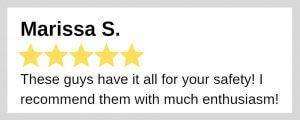Having adequate fire safety equipment in your commercial building is vital. Whether it’s new construction or a renovation project, a properly planned fire protection strategy is necessary.
The right equipment will combat fires before it gets uncontrollable and overwhelming. This plan will help lessen damages to the commercial building and the actual structure. More importantly, a fire protection plan supplemented with the right equipment will help save lives.
When fire emergencies and other disasters strike, visible security and safety equipment must be within reach. Additionally, proper instructions and guidelines on how to operate this equipment must be relayed to the employees, guests, and customers.

The right response to these emergencies could mean the difference between life and death.
Before we discuss the necessary equipment you must install in your commercial building, let’s first identify the classes of fire.
These fires involve solid combustible materials that are naturally organic. A good example is materials that leave carbon after combustion, such as cloth, wood, paper, etc. In this class of fire, water is essential for extinguishing the flames.
This class of fire involves liquefiable solids or flammable liquids, such as solvents, petroleum products, paints, etc. To successfully extinguish this class of fire, you need fire safety equipment that uses foam. You must also utilize the starvation principle.
 This class of fire involves liquefied gases or gases that are under pressure. You should quarantine the burning gas quickly using a vaporizing liquid, powder, or inert gas for putting out the fire. Some examples are hydrogen, fuel gas, liquefied petroleum gas (LPG), etc. To successfully extinguish this class of fire, you’ll need to utilize the smothering technique using carbon dioxide agents.
This class of fire involves liquefied gases or gases that are under pressure. You should quarantine the burning gas quickly using a vaporizing liquid, powder, or inert gas for putting out the fire. Some examples are hydrogen, fuel gas, liquefied petroleum gas (LPG), etc. To successfully extinguish this class of fire, you’ll need to utilize the smothering technique using carbon dioxide agents.
This class of fire happens in combustible metals. These metals are also called Alkali Metals; some examples are sodium, titanium, magnesium, etc. To successfully extinguish this class of fire, you need specialized fire safety equipment, techniques, and extinguishing agents.
According to the National Fire Protection Association, electrical fires are any fire that includes electrical equipment. However, these types of fires may also fall under Class A, B, or C of fires.
When encountering an electrical fire, you must immediately cut off the power supply. The best fire safety equipment to use in this emergency is the extinguishing method depending on what the burning material is.
Special fire extinguishing instruments that are not used for electrical conduction should be applied. Also, non-damaging fire extinguishing agents such as carbon dioxide must be utilized. These types of fire safety equipment won’t damage your electrical equipment any further.
There are many important considerations when selecting the right fire safety equipment for your commercial building.
How big is your small building? What industry are you in? Do you have guests and visitors regularly coming in and out? Do you have staff working nights? A commercial fire protection specialist can help you devise the right fire safety and protection plan, along with the necessary fire equipment custom for your business operations.
Here are the essential fire safety equipment items that you should look into installing in your commercial establishment.
 When there’s smoke, smoke detectors emit a sound or visual alarm warning building occupants of a fire. Smoke detectors come in different shapes and sizes and are enclosed in a plastic container. The smoke gets detected either physically or optically.
When there’s smoke, smoke detectors emit a sound or visual alarm warning building occupants of a fire. Smoke detectors come in different shapes and sizes and are enclosed in a plastic container. The smoke gets detected either physically or optically.
On the other hand, a fire detector identifies and responds to fire or flame manifestation. The type of response will depend on how the fire detector was installed. It may involve deactivating the fuel line, sending out an alarm, triggering a fire suppression system, or sending a warning to a central monitoring station.

These pieces of fire protection equipment must be present in any establishment. An extinguisher manages smaller fires.
On the other hand, more significant out-of-control fires must be addressed by the appropriate fire suppression systems.
Speak with a professional fire safety equipment specialist for the proper maintenance, testing, and repair of these devices. They need to be in the best working order to be able to work correctly.